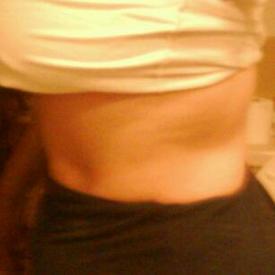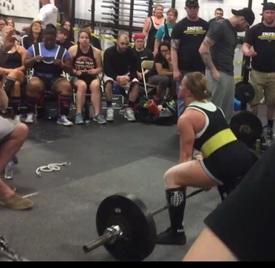If you can lift the same...

magpie0
Posts: 194 Member
Amount of weight while losing weight, is that indicative of little muscle loss and that most to the lost weight was fat?
0
Replies
-
you have to take measurements before and after. using the calculators for lean body mass and body calculators
you can get an estimate of how much muscle has or hasn't been lost.0 -
I carry my weight around my lower belly, which isn't taken into account in body fat calculations.0
-
maintaining strength is a positive indicator yes, but body fat calipers work pretty well if used correctly0
-
Strength gains doesn't equal muscle gain. How much you lift does not equal how much muscle you have either.0
-
How??Strength gains doesn't equal muscle gain. How much you lift does not equal how much muscle you have either.0 -
How??Strength gains doesn't equal muscle gain. How much you lift does not equal how much muscle you have either.
Increases in muscle strength occur because of increased muscle fiber recruitment as well as more efficient firing patterns of individual muscle fibers. One can significantly increase one's muscle strength (amount of weight lifted) with only minimal increases in muscle fiber size. Over time, and with the appropriate diet and training volume, the actual cross-sectional area of the muscle increases in size (hypertrophy) and that can be associated with further increases in strength.0 -
I agree with you but that's not the question, OP's question was if maintaining (or even gaining) strength while losing weight was a good indicator of low muscle loss v. fat loss, which it is. Muscle isn't going to get smaller if you aren't getting weaker (aka provide the same amount of workload and stimulus).Strength gains doesn't equal muscle gain. How much you lift does not equal how much muscle you have either.0 -
Amount of weight while losing weight, is that indicative of little muscle loss and that most to the lost weight was fat?
Not necessarily. It could also mean you weren't lifting enough in the first place.0 -
I agree with you but that's not the question, OP's question was if maintaining (or even gaining) strength while losing weight was a good indicator of low muscle loss v. fat loss, which it is. Muscle isn't going to get smaller if you aren't getting weaker (aka provide the same amount of workload and stimulus).Strength gains doesn't equal muscle gain. How much you lift does not equal how much muscle you have either.
Well I'm glad you understood bc that's the only thing I could grasp from it. That's all I read into it as I see that a lot here, people get stronger so they automatically assume its muscle gain. 0
That's all I read into it as I see that a lot here, people get stronger so they automatically assume its muscle gain. 0 -
There are multiple ways to measure bodyfat. If you find your current method isn't accurate try a different one.
I concur with the rest.0 -
Yeah happens a lot here lol
I agree with you but that's not the question, OP's question was if maintaining (or even gaining) strength while losing weight was a good indicator of low muscle loss v. fat loss, which it is. Muscle isn't going to get smaller if you aren't getting weaker (aka provide the same amount of workload and stimulus).Strength gains doesn't equal muscle gain. How much you lift does not equal how much muscle you have either.
Well I'm glad you understood bc that's the only thing I could grasp from it. That's all I read into it as I see that a lot here, people get stronger so they automatically assume its muscle gain.0
That's all I read into it as I see that a lot here, people get stronger so they automatically assume its muscle gain.0 -
no it's not. anyone whos a beginner can easily get stronger while losing muscle mass simply from CNS adaptation alone.
I agree with you but that's not the question, OP's question was if maintaining (or even gaining) strength while losing weight was a good indicator of low muscle loss v. fat loss, which it is. Muscle isn't going to get smaller if you aren't getting weaker (aka provide the same amount of workload and stimulus).Strength gains doesn't equal muscle gain. How much you lift does not equal how much muscle you have either.
if this was an advanced athlete with years of training you would be correct, but I doubt thats what the OP is.0 -
Not sure if I should take the time to seriously respond to this.
no it's not. anyone whos a beginner can easily get stronger while losing muscle mass simply from CNS adaptation alone.
I agree with you but that's not the question, OP's question was if maintaining (or even gaining) strength while losing weight was a good indicator of low muscle loss v. fat loss, which it is. Muscle isn't going to get smaller if you aren't getting weaker (aka provide the same amount of workload and stimulus).Strength gains doesn't equal muscle gain. How much you lift does not equal how much muscle you have either.
if this was an advanced athlete with years of training you would be correct, but I doubt thats what the OP is.0 -
you can try, but not possible because you're wrong.
Not sure if I should take the time to seriously respond to this.
no it's not. anyone whos a beginner can easily get stronger while losing muscle mass simply from CNS adaptation alone.
I agree with you but that's not the question, OP's question was if maintaining (or even gaining) strength while losing weight was a good indicator of low muscle loss v. fat loss, which it is. Muscle isn't going to get smaller if you aren't getting weaker (aka provide the same amount of workload and stimulus).Strength gains doesn't equal muscle gain. How much you lift does not equal how much muscle you have either.
if this was an advanced athlete with years of training you would be correct, but I doubt thats what the OP is.0 -
I carry my weight around my lower belly, which isn't taken into account in body fat calculations.
It is if you get pinched. Find a place with calipers...0 -
Strength gains doesn't equal muscle gain. How much you lift does not equal how much muscle you have either.
^^ this is true0 -
Could you give me a scenario when you're muscles will atrophy in response to strength training? The fact that you are giving your body enough stimulus that you would have to adapt and become efficient at neuromuscular junctions would mean your muscles are also being stimulated.you can try, but not possible because you're wrong.0 -
i think people r 2 obsesses with bodyfat%. just look in the mirror or look at picures and the scale. everyone stores fat differently. some people look great at 11%. some people need to get down to 8%. all the tools that we use to measure bf% r not very accurate anyway.0
-
the concern is usually more about catabolism rather than atrophy where "weight loss" is the goal.
if the OP wants to measure fat/muscle loss/gain accurately they should get a dexa scan.
the weight you can lift is not an accurate measure of muscle mass - things like better muscle recruitment, technique improvements, leverage changes and a host of other things can all easily affect the weight you can lift (for better or worse), even if your muscle mass stays exactly the same.0 -
Going catabolic to the point where your muscles are being broken down for energy would be indicative of a terribly high caloric deficit, in which case you wouldn't be able to maintain your strength anyway (and yes... your muscles will also start atrophy at this point as stimulus can't be provided). Keep in mind that I'm not saying muscle mass/size = strength. I'm saying a good way to MAINTAIN muscle mass during a cut/weight loss period is to maintain your strength levels.the concern is usually more about catabolism rather than atrophy where "weight loss" is the goal.
if the OP wants to measure fat/muscle loss/gain accurately they should get a dexa scan.
the weight you can lift is not an accurate measure of muscle mass - things like better muscle recruitment, technique improvements, leverage changes and a host of other things can all easily affect the weight you can lift (for better or worse), even if your muscle mass stays exactly the same.0 -
I'm not saying muscle mass/size = strength
im glad we all agree now.0 -
If you're on a machine, where proper technique is not a big concern, how is strength not an indicator of muscle mass?0
-
Did we ever have a disagreement? My first post in this thread mentioned this, but that wasn't the question the OP asked.I'm not saying muscle mass/size = strength
im glad we all agree now.0 -
increase in muscle mass/size doesnt mean an increase in strength??? u cannot have significant muscle hypertrophy without an increase in strength.I'm not saying muscle mass/size = strength
im glad we all agree now.0 -
My fat is spread unevenly so I think calipers would give me an overestimate and the military body fat an underestimate. I don't feel like paying for the official number either.0
-
Reading too much into what I said. I mentioned that muscle mass =/= strength. That does NOT mean muscle size and strength have absolutely NO correlation (in fact, some of the best natural bodybuilders are also great powerlifters). You will get stronger doing hypertrophy work and you will get bigger doing strength training routines. The rate of which you get stronger/bigger will be reflected upon how you train (for hypertrophy or strength). This isn't even including genetics which play a huge role in muscle development.
increase in muscle mass/size doesnt mean an increase in strength??? u cannot have significant muscle hypertrophy without an increase in strength.I'm not saying muscle mass/size = strength
im glad we all agree now.0 -
Everyone's fat is spread unevenly, that's why caliper tests (the good ones anyway) take measurements from many different areas in your body.My fat is spread unevenly so I think calipers would give me an overestimate and the military body fat an underestimate. I don't feel like paying for the official number either.0 -
http://www.ncbi.nlm.nih.gov/pubmed/9164284
From this paper's abstract:
"Most of these studies are cross-sectional comparisons in which muscle mass and strength tend to be linearly related, so that those with more muscle tend to be stronger"
Looking for 'these studies' atm.0 -
This study got their data from measuring grip strength for upper body and knee extension strength for lower body. Sorry if I don't find this evidence conclusive.http://www.ncbi.nlm.nih.gov/pubmed/9164284
From this paper's abstract:
"Most of these studies are cross-sectional comparisons in which muscle mass and strength tend to be linearly related, so that those with more muscle tend to be stronger"
Looking for 'these studies' atm.0 -
yes!
Reading too much into what I said. I mentioned that muscle mass =/= strength. That does NOT mean muscle size and strength have absolutely NO correlation (in fact, some of the best natural bodybuilders are also great powerlifters). You will get stronger doing hypertrophy work and you will get bigger doing strength training routines. The rate of which you get stronger/bigger will be reflected upon how you train (for hypertrophy or strength). This isn't even including genetics which play a huge role in muscle development.
increase in muscle mass/size doesnt mean an increase in strength??? u cannot have significant muscle hypertrophy without an increase in strength.I'm not saying muscle mass/size = strength
im glad we all agree now.0
This discussion has been closed.
Categories
- All Categories
- 1.4M Health, Wellness and Goals
- 398.2K Introduce Yourself
- 44.7K Getting Started
- 261K Health and Weight Loss
- 176.4K Food and Nutrition
- 47.7K Recipes
- 233K Fitness and Exercise
- 462 Sleep, Mindfulness and Overall Wellness
- 6.5K Goal: Maintaining Weight
- 8.7K Goal: Gaining Weight and Body Building
- 153.5K Motivation and Support
- 8.4K Challenges
- 1.4K Debate Club
- 96.5K Chit-Chat
- 2.6K Fun and Games
- 4.8K MyFitnessPal Information
- 12 News and Announcements
- 21 MyFitnessPal Academy
- 1.6K Feature Suggestions and Ideas
- 3.2K MyFitnessPal Tech Support Questions







